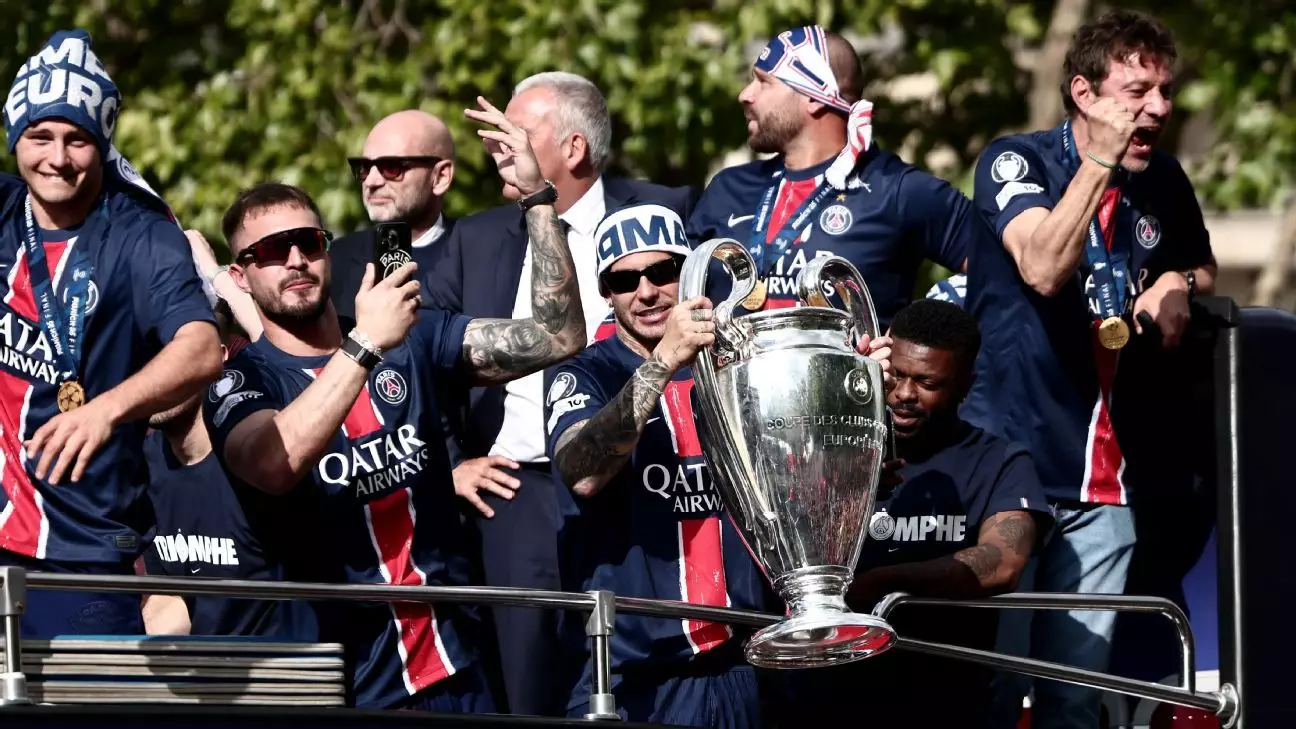The vibrant streets of Paris erupted in celebration following Paris Saint-Germain’s (PSG) historic victory in the Champions League, marking the club’s first triumph in European football’s most prestigious tournament. While fans gathered en masse to cheer their heroes as the team paraded down the iconic Champs-Elysees in an open-top bus, the overwhelming euphoria was sharply contrasted by a series of tragic incidents that marred the festivities. As the team basked in the glory of a decisive 5-0 win against Inter Milan, the shadow of violence loomed large, reminding us that with great triumph often comes unexpected sorrow.
The champions’ parade was intended as a jubilant toast to their hard-fought victory. Players donned sunglasses while hoisting their coveted trophy high, and the celebrations at the Eiffel Tower, bathed in PSG’s colors, painted a picture of unity and joy. Yet the celebration quickly transitioned into chaos with reports of violence breaking out across the nation. An unsettling undercurrent ran through the joyous atmosphere, highlighting how quickly joy can turn to despair when uncontrollable elements disrupt communal celebrations.
Disturbing Violence Amid Celebrations
The national police reported disturbing tales of fatalities and injuries occurring during the overnight festivities. A 17-year-old boy’s tragic death in the city of Dax during a street party sparked outrage and concern, with law enforcement indicating that the incident was not directly linked to the match itself. In Paris, another senseless loss emerged as a man in his twenties was killed in a horrific scooter accident while taking part in the celebrations. Such incidents forced PSG to release statements denouncing the violence, reminding fans that such acts stand in stark opposition to the club’s spirit and values.
The kaleidoscope of emotions displayed during the parade could not mask the reality that violence punctuated what should have been a night of unbridled joy. Fans had gathered to celebrate a long-awaited accomplishment; instead, they grappled with tragedy. The juxtaposition of jubilant supporters chanting club anthems against reports of police officers injured by fireworks and several others treated for minor injuries elevated tension among the general public, casting a shadow over what was meant to be a collective celebration of triumph.
The Response of Authorities and the Public’s Reaction
With reports of injuries surpassing 200 and looting in various parts of the city, authorities faced immense pressure to maintain order. A substantial police presence ensured a semblance of control, yet law enforcement’s methods raised eyebrows, especially in light of instances where teargas was deployed against rowdy crowds. The potential impact on public trust and relationship between law enforcement and citizens threatens to complicate celebrations for future sporting events.
Furthermore, the violence and injuries sustained by both police and civilians have ignited discussions about the behavioral patterns observed during national celebrations. Similar incidents after significant sporting wins, such as France’s World Cup victory in 2018, displayed patterns of unrest that are concerning. Many could argue that sporadic acts of violence detract from the essence of celebrating collective accomplishments and obscure individual commendation.
Celebration Potential in the Eye of the Storm
Despite the disheartening events, it is vital to emphasize the ecstatic heart of the day—the newcomers to soccer’s pantheon were not just players; they were symbols of hope and resilience for millions. PSG’s official celebration at the Parc des Princes promised a concert and a grand light show, intended as a homage to their beloved fans. The very fabric of Paris seemed to weave a narrative brimming with cultural pride that transcended mere numbers and statistics.
Much of the fan experience is derived from the collective spirit and camaraderie felt during such events. There is a powerful emotion tied to rooting for a shared cause, and PSG’s win brings that sense of togetherness into focus. Even amidst perilous challenges, the favorable 90 minutes played at Munich allows fans to find belief and inspiration in their team’s achievements, establishing a narrative steeped in solidarity.
Yet, as Paris embarks on its celebratory journey, it must navigate the turbulent waters peppered with incidents that threaten communal joy. How the city chooses to respond—either by fostering environments for peaceful celebrations or allowing violence to overshadow those moments—will ultimately define not only their annual festivities but also reflect upon the nature of fandom in modern times.

Leave a Reply